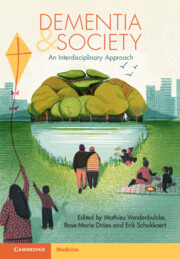Book contents
- Dementia and Society
- Dementia and Society
- Copyright page
- Contents
- Contributors
- Additional material
- Preface
- Chapter 1 Different Perspectives on Dementia
- Chapter 2 From History to Intervention
- Chapter 3 Personhood, Identity and Autonomy
- Chapter 4 Living Meaningfully with Dementia
- Chapter 5 Quality of Life of Persons with Dementia
- Chapter 6 Living with Dementia
- Chapter 7 Informal Care for Persons with Dementia
- Chapter 8 Risk Factors and Non-Pharmacological Prevention of Dementia
- Chapter 9 An Empowering Dementia Environment
- Chapter 10 The Impact of the COVID-19 Pandemic on the Well-Being of People Living with Dementia
- Chapter 11 Care Planning and the Lived Experience of Dementia
- Chapter 12 Societal and Ethical Views on End-of-Life Decisions in Dementia
- Chapter 13 Driving and Dementia
- Chapter 14 Social and Private Costs of Dementia
- Index
- References
Chapter 12 - Societal and Ethical Views on End-of-Life Decisions in Dementia
Published online by Cambridge University Press: 26 May 2022
- Dementia and Society
- Dementia and Society
- Copyright page
- Contents
- Contributors
- Additional material
- Preface
- Chapter 1 Different Perspectives on Dementia
- Chapter 2 From History to Intervention
- Chapter 3 Personhood, Identity and Autonomy
- Chapter 4 Living Meaningfully with Dementia
- Chapter 5 Quality of Life of Persons with Dementia
- Chapter 6 Living with Dementia
- Chapter 7 Informal Care for Persons with Dementia
- Chapter 8 Risk Factors and Non-Pharmacological Prevention of Dementia
- Chapter 9 An Empowering Dementia Environment
- Chapter 10 The Impact of the COVID-19 Pandemic on the Well-Being of People Living with Dementia
- Chapter 11 Care Planning and the Lived Experience of Dementia
- Chapter 12 Societal and Ethical Views on End-of-Life Decisions in Dementia
- Chapter 13 Driving and Dementia
- Chapter 14 Social and Private Costs of Dementia
- Index
- References
Summary
Most people in contemporary western societies do not die suddenly, but from organ failure or dementia after a period with declining health due to chronic-progressive disease. With increasing options for care and treatment, decisions about useful or desirable treatment and care are made in the last phase of life of most people. In this chapter, we report on three categories of end-of-life decisions that are made in dementia care. First, decisions primarily aimed at alleviating pain and other symptoms or improving quality of life in other ways, while possible effects on length of life are deemed irrelevant compared to that aim. Second, decisions around life-sustaining treatments or treatments to cure acute or co-morbid conditions which may or may not affect length and quality of life. Examples of such treatments are cardiopulmonary resuscitation, use of antibiotics, and artificial nutrition and hydration. Third, decisions around terminating life, e.g. euthanasia. For all these decisions, we focus on clinical as well as on some societal and ethical perspectives.
Keywords
- Type
- Chapter
- Information
- Dementia and Society , pp. 233 - 250Publisher: Cambridge University PressPrint publication year: 2022

